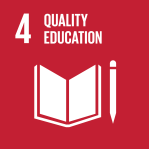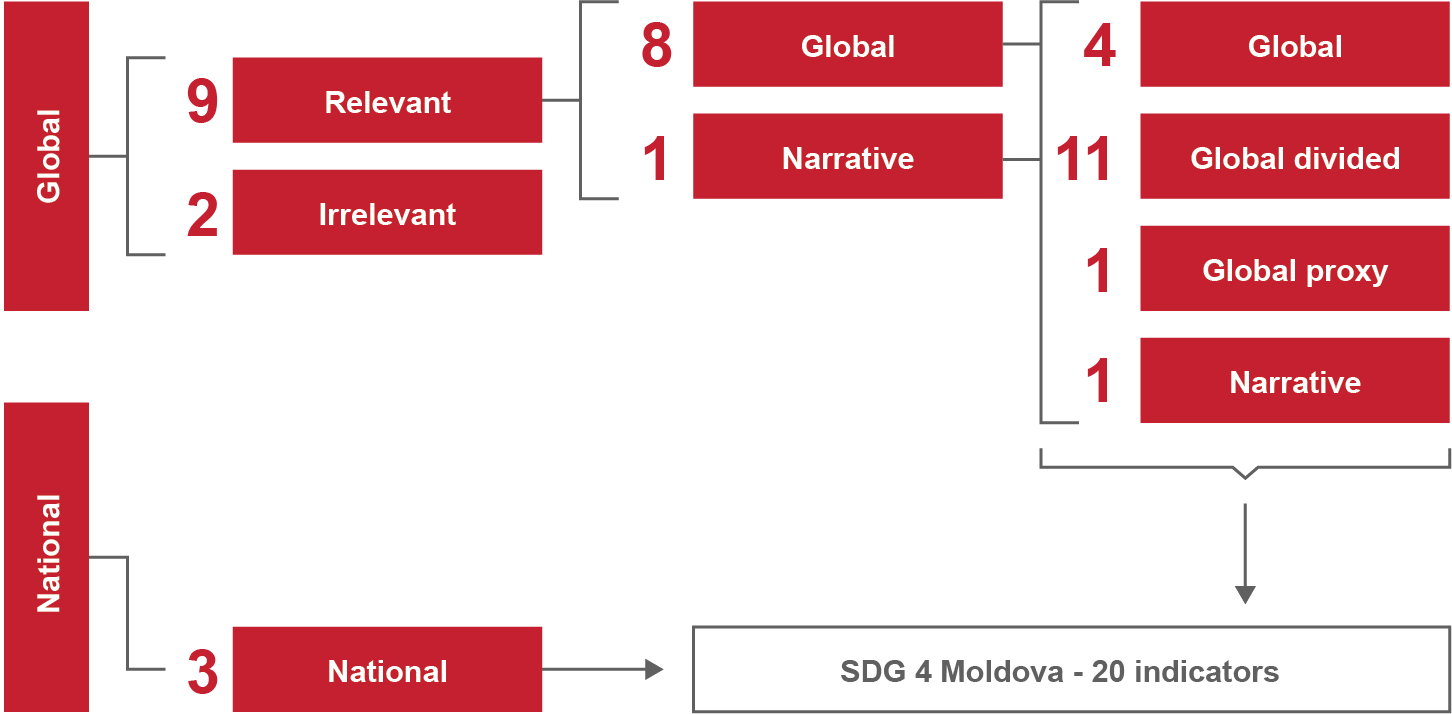Goal 4 envisages achieving universal and inclusive education, but also preparing the youth and adults to better fit the labour market. The goal’s targets aim to increase access to education for all, including vulnerable groups, such as persons with disabilities, and also to provide quality education at each level: form early childhood development care to higher education. It is important that the Agenda envisages not only the role of new entrants on the labour market, but also those with outdated skills or no skills at all in the context of the changing needs of the Moldovan economy. Also, important values for the society, such as sustainable development and sustainable lifestyles, human rights, gender equality, a green economy, promotion of a culture of peace and non-violence, global citizenship and appreciation of cultural diversity will be promoted through their integration in the educational curricula. One of the challenges to be also addressed relates to ensuring education facilities that are child-, disability- and gender-sensitive, and providing a safe, non-violent, inclusive and effective learning environments for all. |
| Results of indicators nationalization SDG 4
|
Goal 4. Ensure inclusive and equitable quality education and promote lifelong learning opportunities for all |
|
| Goal 4. Ensure inclusive and equitable quality education and promote lifelong learning opportunities for all | |
GLOBAL TARGETS 2019 | GLOBAL INDICATORS 2019 |
| NATIONAL TARGETS 2017* | NATIONAL INDICATORS 2017* |
4.1 By 2030, ensure that all girls and boys complete free, equitable and quality primary and secondary education leading to relevant and effective learning outcomes | 4.1.1 Proportion of children and young people (a) in grades 2/3; (b) at the end of primary; and (c) at the end of lower secondary achieving at least a minimum proficiency level in (i) reading and (ii) mathematics, by sex |
| 4.1 By 2030, ensure that all girls and boys complete free, equitable and quality primary and secondary education leading to relevant and effective learning outcomes | 4.1.1. Proportion of children and youth at the end of lower secondary achieving at least a minimum proficiency level in (a) reading and (b) mathematics, by sex |
|
|
| | 4.1.2 Primary education graduation rate, by sex |
|
|
| | 4.1.3 Lower secondary education graduation rate, by sex |
4.2 By 2030, ensure that all girls and boys have access to quality early childhood development, care and pre‑primary education so that they are ready for primary education | 4.2.1 Proportion of children under 5 years of age who are developmentally on track in health, learning and psychosocial well-being, by sex |
| 4.2 By 2030, ensure that all girls and boys have access to early childhood development care and pre-primary education so that they are ready for primary education | 4.2.1 Early development index for children up to 5 years old, by sex |
| 4.2.2 Participation rate in organized learning (one year before the official primary entry age), by sex |
| | 4.2.2 Participation rate in organized learning (one year before the official primary entry age) |
4.3 By 2030, ensure equal access for all women and men to affordable and quality technical, vocational and tertiary education, including university | 4.3.1 Participation rate of youth and adults in formal and non-formal education and training in the previous 12 months, by sex |
| 4.3 By 2030, increase enrolment in affordable and quality vocational and higher education | 4.3.1 Youth and adult participation rate in life-long formal and non-formal education, by sex (over the past 12 months) |
4.4 By 2030, substantially increase the number of youth and adults who have relevant skills, including technical and vocational skills, for employment, decent jobs and entrepreneurship | 4.4.1 Proportion of youth and adults with information and communications technology (ICT) skills, by type of skill |
| 4.4 By 2030, substantially increase the number of youth and adults who have relevant skills for the labour market | 4.4.1 Proportion of youth and adults with information and communications technology (ICT) skills, by type of skill |
|
|
| | 4.4.2 1 Proportion of youth and adults with occupational skills necessary for employment |
4.5 By 2030, eliminate gender disparities in education and ensure equal access to all levels of education and vocational training for the vulnerable, including persons with disabilities, indigenous peoples and children in vulnerable situations | 4.5.1 Parity indices (female/male, rural/urban, bottom/top wealth quintile and others such as disability status, indigenous peoples and conflict-affected, as data become available) for all education indicators on this list that can be disaggregated |
| 4.5 By 2030, ensure equal access to all levels of education and vocational training for the vulnerable, including persons with disabilities and children in vulnerable situations | 4.5.1.1 Gender parity index, primary level |
|
|
| | 4.5.1.2 Gender parity index, lower secondary level |
|
|
| | 4.5.1.3 Gender parity index, higher secondary level |
|
|
| | 4.5.1.4 Gender parity index, tertiary level |
4.6 By 2030, ensure that all youth and a substantial proportion of adults, both men and women, achieve literacy and numeracy | 4.6.1 Proportion of population in a given age group achieving at least a fixed level of proficiency in functional (a) literacy and (b) numeracy skills, by sex |
| Not relevant | |
4.7 By 2030, ensure that all learners acquire the knowledge and skills needed to promote sustainable development, including, among others, through education for sustainable development and sustainable lifestyles, human rights, gender equality, promotion of a culture of peace and non-violence, global citizenship and appreciation of cultural diversity and of culture’s contribution to sustainable development | 4.7.1 Extent to which (i) global citizenship education and (ii) education for sustainable development, including gender equality and human rights, are mainstreamed at all levels in (a) national education policies; (b) curricula; (c) teacher education; and (d) student assessment |
| 4.7 By 2030, ensure that all learners acquire the knowledge and skills needed to promote sustainable development and sustainable lifestyles, human rights, environmental protection, gender equality, culture of peace and non-violence, global citizenship and appreciation of cultural diversity and of culture’s contribution to sustainable development | 4.7.1 Existence in the curricula of the following modules: i) sustainable development, ii) human rights, iii) gender equality, iv) sexual education |
4.a Build and upgrade education facilities that are child, disability and gender sensitive and provide safe, non-violent, inclusive and effective learning environments for all | 4.a.1 Proportion of schools with access to (a) electricity; (b) the Internet for pedagogical purposes; (c) computers for pedagogical purposes; (d) adapted infrastructure and materials for students with disabilities; (e) basic drinking water; (f) single-sex basic sanitation facilities; and (g) basic handwashing facilities (as per the WASH indicator definitions) |
| 4.a Build and upgrade education facilities that are child, disability and gender sensitive and provide safe, non-violent, inclusive and effective learning environments for all | 4.a.1.1 Proportion of schools with access to Internet for pedagogical purposes |
|
|
| | 4.a.1.2 Proportion of schools with access to computers for pedagogical purposes |
|
|
| | 4.a.1.3 Proportion of schools adapted infrastructure and materials for students with disabilities |
|
|
| | 4.a.1.4 Proportion of schools with single-sex basic sanitation facilities; |
4.b By 2020, substantially expand globally the number of scholarships available to developing countries, in particular least developed countries, small island developing States and African countries, for enrolment in higher education, including vocational training and information and communications technology, technical, engineering and scientific programmes, in developed countries and other developing countries | 4.b.1 Volume of official development assistance flows for scholarships by sector and type of study |
| No relevant | |
4.c By 2030, substantially increase the supply of qualified teachers, including through international cooperation for teacher training in developing countries, especially least developed countries and small island developing States | 4.c.1 Proportion of teachers in: (a) pre-primary; (b) primary; (c) lower secondary; and (d) upper secondary education who have received at least the minimum organized teacher training (e.g. pedagogical training) pre-service or in-service required for teaching at the relevant level in a given country |
| Not examined | 4.c.1.1 Proportion of teachers with pedagogical education in pre-primary education, % |
|
|
| | 4.c.1.2 Proportion of teachers with pedagogical education in primary education, % |
|
|
| | 4.c.1.3 Proportion of teachers with pedagogical education in higher-secondary education, % |
Note:
* Nationalized targets, nationalized indicators and statistical data presented under this heading are taken from the Report "Nationalization of indicators for SDG" and Adapting the 2030 Agenda on Sustainable Development to the context of the Republic of Moldova elaborated by Expert-Grup in collaboration with the Government of the Republic of Moldova and UN Moldova in 2017 and presents the situation at that time. Currently, the next stage of revising the nationalized indicators is taking place, thus, some indicators can be revised or supplemented later.
 |  |  |  |  |  |  |  |  |
 |  |  |  |  |  |  |  |  |

 Goal 4: Ensure inclusive and equitable quality education and promote lifelong learning opportunities for all
Goal 4: Ensure inclusive and equitable quality education and promote lifelong learning opportunities for all